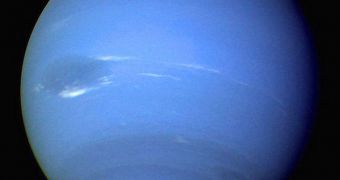Astronomers say that a large comet may have stricken the gas giant Neptune not two centuries ago. They base their statement on the fact that the atmosphere surrounding the planet is very rich in carbon monoxide, which had no way of appearing on the space object through natural processes. The findings were presented in Miami, Florida this week, at the 216th meeting of the American Astronomical Society (AAS 2010). The paper was presented by European Space Agency (ESA) Herschel Space Observatory project scientist Paul Hartogh, Nature News reports.
The Herschel, launched alongside the Planck telescope one year ago, is the largest, most advanced space-based observatory in Earth's orbit today. It conducts its studies in infrared wavelengths, and has the observational power to penetrate far into the Universe, near the first moments following the Big Bang. Though only recently launched, its findings have already provided new knowledge for astronomers. The Neptune studies are part of an ongoing campaign the science team managing the telescope currently conducts in the solar system.
At this point, the high carbon monoxide concentrations in Neptune's atmosphere can only be explained through two theories. The first is that a comet struck the planet about 200 years ago. The chemical may have resulted from the reactions that were triggered between the ice on the impactor and substances already present in the atmosphere. The second explanation is that Neptune contains a vast reservoir of chemicals under its surface, which may be gradually leaking on the outside, and producing the spikes visible to our telescopes.
“We're certain now that there must be an external source of carbon monoxide. The most spectacular method is having cometary icy body impacts,” University of Oxford planetary physicist Leigh Fletcher says. He was not a part of the current investigation, but he has a lot of experience in studying Neptune. Last week, the scientist published a scientific research paper, in which he showcased the results of his team's investigations of the gas giant's atmosphere. The datasets were collected using the AKARI2 satellite, a mission managed by the Japanese Aerospace Exploration Agency (JAXA).

 14 DAY TRIAL //
14 DAY TRIAL //